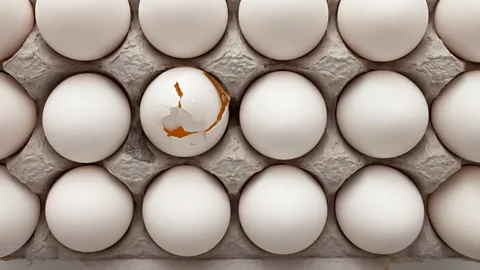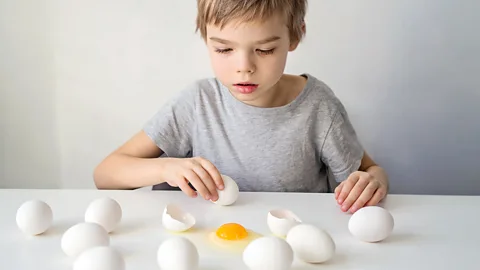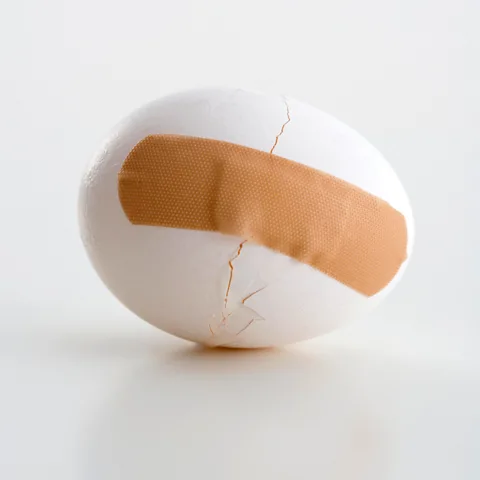Why young children don't understand 'pranks'
 Getty Images
Getty ImagesRecent social media trends that involve parents "pranking" their kids for comedic effect may miss an important factor – young children may not have a sense of humour developed enough to be able to find it funny.
A small boy in a dinosaur shirt stands at a countertop in front of an empty bowl, looking expectant. Next to him, a woman – apparently his caregiver – holds an egg. As he watches, she goes to crack it – and smacks it on his forehead, not the bowl. "Ow!" he says, rubbing his head. "That hurt!"
Cracking an egg on a child's head is one of the latest trends to go viral on social media. As of 30 August, the #eggcrackchallenge tag had accumulated nearly 75 million views on Tiktok. Most of the children in the videos appear to be young, often preschool- or toddler-aged. And while they all have their own unique reactions to getting an egg unexpectedly cracked on their head – whether saying it hurt, looking surprised, bursting into tears, or even pushing or hitting their parent – there is a common theme. Most do not seem to find it funny… even if their parents are guffawing in laughter.
That's no surprise, say psychology experts, and there are a few reasons why. For one, most young children cannot grasp the kind of humour that relies on "pranking" an unsuspecting victim. Egg-cracking is just the latest example.
Putting aside an additional issue – that these pranks are being filmed and published online to audiences of, sometimes, millions of people, often without the child's consent – what is it about "pranking" a small child that makes it, to them and at least some of the adults watching, deeply unfunny?
For a start, there is a reason practical jokes played against children often make adults feel uncomfortable, too: there can be a fine line between pranking and bullying, experts say. That's even more true when the victim of the practical joke is less powerful than the instigator, a reason why one frequently-cited "rule" of comedy is to "punch up, not kick down". (If an adult plays a prank on a child, they're always going to be "kicking down".)
Of course, even for adults or adolescents, being the victim of a practical joke isn't always funny. If it is seen as funny, says Rachel Melville-Thomas, child psychotherapist and spokesperson for the Association of Child Psychotherapists (ACP) in the UK, it's often because the victim immediately grasps the set-up, hasn't been left harmed in any way, and quickly can join in and laugh along.
 Getty Images
Getty Images"What we want to do is laugh together – laughing together creates cohesion in social groups," she says. "If you're the victim of a prank, [for it to be funny], you have to very quickly join in and go 'Ah, that was such a clever prank'. It's hard to see how that happens if you smack someone on the head."
Because of their stage of development, meanwhile, quickly grasping any intended humour is even more difficult for a young child.
It's true that children can grasp humour from a young age. Some research has found, for example, that while even the most sophisticated types of humour – sarcasm and irony – usually are understood between the ages of five and six, some children as young as three and four years old can "get" the joke.
Among other reasons that make the humour of the situation difficult for small children to grasp is the fact that these skills, crucially, are tied to something called theory of mind. The ability to attribute mental states to both oneself and to others, this allows us to understand that someone can think, feel, and expect something different from someone else – and though it varies between children (and continues to develop throughout childhood and adolescence), it often matures between 3.5 and 4.5 years old.
But even with theory of mind, there are limits, and like any developmental skill, humour isn't an on-off switch. Appreciating the humour of a situation "represents a complex, high order process that involves cognitive, behavioural, physiological, emotional, and social components", as researchers have put it. This is part of the reason some academics are using tests of humour to explore whether you can assess the variations between theory of mind ability in even healthy adults.
Some experts also find themselves scratching their heads at how, given the physical violation involved (and the fact, from some of the children's reactions, that it seems to have hurt them), that this is meant to be particularly humorous at all. Researchers have described online pranking videos, and particularly those that focus on the emotional response and pain of the victim, as the "dark side" of social media culture.
One commonly accepted theory of what makes something humorous is that it's "incongruous" – there is a violation of expectations. It's theorised that this is why many people find slapstick humour funny, for example. Much of the early humour children use stems from a developing sense of the absurd. "Little children find out-of-place things funny, like an elephant with a hat on," says Melville-Thomas. "The problem with this [prank] is that it's absolutely out of the blue… It's set in a cute, 'Let's cook together with Mommy'-type situation, and then you basically hit your child."
With the egg-cracking trend, another part of the intended humour might be that the adult is pretending that the child represents a bowl, says Paige Davis, a developmental psychologist at York St John University who has written about how children develop humour. "It's the parent being like, 'Oh, look, it's a bowl,'" she says. "That's where the funniness is supposed to lie. And the fact that I know that this is going to happen, but the child doesn't."
But just because a child understands that one object can represent a different object doesn't mean they necessarily grasp the idea that their head was representing a bowl, she says – the set-up is all wrong. The children in many of these videos don't seem to understand that there's an element of pretend play – because at the end of the day, it isn't pretend play. It's a prank.
"It's a prank, not a joke," she says. "Not only are they not able to cognitively understand the humour, but they're also the butt of a joke. And there's a violation of trust."
That is what Melville-Thomas worries about, too.
"With a little person under five, you are the secure base. You are the secure place where you can always trust that that person will not harm you," she says. Cracking an egg on a child's forehead violates that trust.
"The parent puts the reward they will get – hits, views, likes, or something, online – higher than stopping to think about how their child will respond," she says. "In that moment, overwhelmingly, something about their own need overtakes the need of the child, with consequences. As a mum myself, my own needs have overtaken the needs of the child on several occasions, but not in a way that attacks the relationship we have – that you can trust me, I'm not going to hit you."
 Getty Images
Getty ImagesAs a child psychotherapist, Melville-Thomas says she also worries that a child could fear it would happen again. "I'm not saying that if you crack an egg on your child's head, they're going to become hyper-vigilant," she says. "But it means you shift in a tiny way to thinking, 'She might do that again', because that's how human brains work."
Even among adults, repeated online pranks against intimate partners can have a negative impact on relationships.
You might also be interested in:
What is particularly interesting to experts like Melville-Thomas and Davis is that, when the children in the videos respond negatively – as they often do – the parent often laughs. It shows a lack of attunement, they say, that is the opposite of what most child development experts today counsel.
None of this is to say that a parent who participates in such a trend has ruined their relationship with their child, Melville-Thomas cautions to add. No parent is perfect, nor should they be.
But, even in situations like this one, repair is important – because it's how it impacted the child, rather than what the caregiver's intention was, that is crucial, experts say.
"It's best to try to talk about it rather than pretend it never happened," says Melville-Thomas. "You can say: 'The other day we were cooking and I thought it was funny, because I saw other people do it, to surprise you by cracking an egg on your head. I realised that that was a dumb thing to do, because actually, it hurt. And I didn't know why I did that. I'm very sorry'. So, you actually give an explanation to your four-year-old – it doesn't matter how young, you can do it to a two-year-old. If you're role modelling your child, you're modelling how to undo things you regret. And that's a good thing."
--
